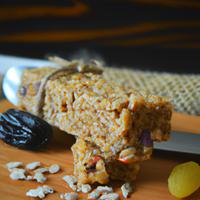
1 serving (50 grams) contains 200 calories, 10.0 grams of protein, 7.0 grams of fat, and 25.0 grams of carbohydrates.

Log this food in SnapCalorie

Nutrition Information
Calories |
946.4 | ||
|---|---|---|---|
% Daily Value* |
|||
| Total Fat | 33.1 g | 42% | |
| Saturated Fat | 9.5 g | 47% | |
| Polyunsaturated Fat | 0 g | ||
| Cholesterol | 0 mg | 0% | |
| Sodium | 709.8 mg | 30% | |
| Total Carbohydrates | 118.3 g | 43% | |
| Dietary Fiber | 23.7 g | 84% | |
| Sugars | 23.7 g | ||
| protein | 47.3 g | 94% | |
| Vitamin D | 236.6 mcg | 1183% | |
| Calcium | 946.4 mg | 72% | |
| Iron | 9.5 mg | 52% | |
| Potassium | 709.8 mg | 15% | |
* Percent Daily Values are based on a 2,000 calorie diet. Your daily values may be higher or lower depending on your calorie needs.
Food Attributes
Source of Calories
About Diet bar
Diet Bar is a convenient snack designed to support balanced eating with a blend of essential nutrients. Typically associated with modern health-conscious cuisine, it often contains ingredients like oats, nuts, seeds, dried fruits, and protein isolates, complemented by natural sweeteners such as honey or stevia. Packed with fiber, protein, and healthy fats, Diet Bars help curb hunger and provide sustained energy, making them a popular choice for busy individuals or fitness enthusiasts. However, it's important to check labels, as some varieties may include added sugars or preservatives that can reduce their health benefits. Ideal for on-the-go consumption, they cater to numerous dietary preferences, including vegan, gluten-free, or low-calorie options. While a Diet Bar can be part of a nutritious lifestyle, it’s best paired with whole foods to ensure a well-rounded diet suited for long-term well-being.



